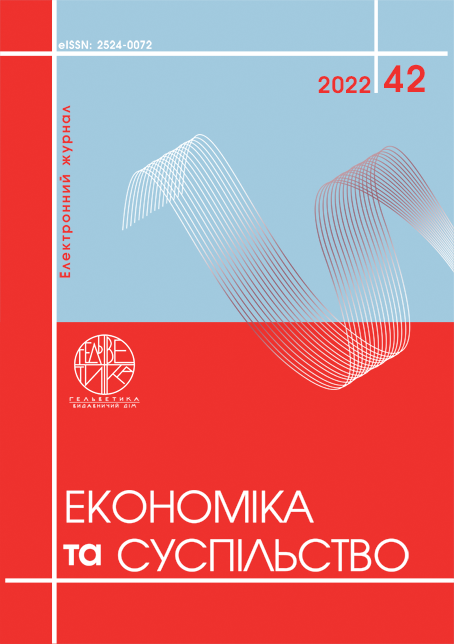FEATURES FORMATION OF MANAGEMENT SYSTEM OF "SMART ENTERPRISES"
Abstract
The article is devoted to the description of the features of the formation of a management system by "smart enterprises". The aim of the study was to analyze theoretical and practical aspects of the features of digital transformation of modern enterprises. The theoretical and methodological basis is the scientific works of domestic and foreign theorists and practitioners. To achieve this goal, the task is set, in particular, to study the features of managing "smart enterprises" and identify elements, the integrated application in practice of which will ensure a high-quality transition of the business entity to the smart level. The paper uses the following methods: formal logic – for analysis, generalization and systematization of the material; tabular – for visual display of the analyzed data; abstract-logical – for substantiating theoretical provisions and formulating conclusions. The article analyzes the views of scientists and practitioners on the interpretation of the term "smart enterprise". This made it possible to identify and characterize the main types of enterprises, depending on the epicenter of digital transformations - Digital, Smart and Virtual enterprises. The relevance and practical significance of the transition of business entities to the level of a "smart enterprise" in the modern business environment is substantiated. The main elements are developed and characterized, the integrated use of which will ensure a high-quality transition of a business entity to the level of a "smart enterprise", in particular: providing reliable infrastructure, big data analytics, artificial intelligence, digital transformation, a team of specialists, and cybersecurity. It is a systematic approach to the integrated application of these elements together that will give a synergistic effect in achieving maximum efficiency from digital transformation and provide it with advantages, in particular: simplification of business processes, reduction of enterprise costs, ensuring adaptability and flexibility, allowing the organization to be customer-oriented, increasing the level of competitiveness, increasing employee productivity and improving the efficiency of the enterprise in the changing and dynamic conditions of the modern business environment. The article highlights the main advantages of enterprises that have undergone digital business transformation.
References
Мейтус В.Ю. Розумні підприємства – основа цифрової економіки. Матеріали круглого столу «Нейронауки та когнітивні системи в економіці» (НаУКМА, 19 лютого 2019 р.) / упоряд. О.В. Гуменна ; Національний університет «Києво-Могилянська академія», Факультет економічних наук, Кафедра маркетингу та управління бізнесом. Київ : НаУКМА, 2019. С. 19–22.
Manufaturing Tomorrowю. Online Trade Magazine – Industry 4.0 Advanced Manufacturing and Factory Automation. URL: https://www.manufacturingtomorrow.com/article/2017/02/what-is-smart-manufacturing--the-smart-factory/9166
Вишневський В.П., Князєв С.І. Смарт промисловість: перспективи і проблеми. Економіка України. 2017. № 7. С. 22–37.
Lucke D., Constantinescu C., Westkaemper E. Smart Factory – A Step towards the Next Generation of Manufacturing. Manufacturing Systems and Technologies for the New Frontier. London : Springer, 2008. pp. 115–118.
Teresko J. Reaching for a smarter factory. Industry Week. 2007. Vol. 256, Issue 9. pp. 29–33.
White paper: A new industrial policy for Flanders. May, 2011. URL: http://www.kuleuven.be/industrieelonderzoeksfonds/nieuws/Witboek_EN_H.pdf
Smart Factory – розумне виробництво. URL: https://www.it.ua/knowledge-base/technology-innovation/smart-factory
Немецкая Индустрия 4.0 VS Американский консорциум промышленного Интернета. 2015. URL: http://fastsalttimes.com/sections/obzor/428.html24
Белая книга. Завод будущего. Женева : Международная Электротехническая Комиссия, 2015. 52 с.
Череватский Д.Ю. Смарт промисловість у різних ракурсах. Економіка промисловості. 2017. № 3 (79). С. 145–153.
Prokopenko, O. et al. (2020). Communication Business Processes of Industrial Enterprises in the Conditions of Globalisation. International Journal of Management, vol. 11(5), pp. 884–895.DOI: https://doi.org/10.34218/IJM.11.5.2020.081
Shpak, N.; Kuzmin, O.; Dvulit, Z.; Onysenko, T.; Sroka, W. Digitalization of the Marketing Activities of Enterprises: Case Study. Information, 2020, 11, 109. DOI: https://doi.org/10.3390/info11020109
Ящишина І. В. Суть та особливості смарт-підприємств. Наукові записки Національного університету «Острозька академія». Серія «Економіка» : науковий журнал. Острог : Вид-во НаУОА, грудень 2018. № 11(39). С. 14–18.
Meytus V. (2019) Rozumni pidpryyemstva – osnova tsyfrovoyi ekonomiky [Smart enterprises are the basis of the digital economy]. Materialy kruhloho stolu "Neyronauky ta kohnityvni systemy v ekonomitsi" (NaUKMA, 19.02.2019) / uporyad. O.V. Humenna ; Natsionalnyy universytet "Kyyevo-Mohylyanska akademiya", Fakultet ekonomichnykh nauk, Kafedra marketynhu ta upravlinnya biznesom. Kyiv: NaUKMA, pp. 19–22.
Manufaturing Tomorrowю. Online Trade Magazine – Industry 4.0 Advanced Manufacturing and Factory Automation. URL: https://www.manufacturingtomorrow.com/article/2017/02/what-is-smart-manufacturing--the-smart-factory/9166
Vyshnevskyy̆ V., Knyazyev S. (2017). Smart promyslovist: perspektyvy i problemy [Smart industry: prospects and problems]. Ekonomika Ukrainy, vol. 7, pp. 22–37.
Lucke D., Constantinescu C., Westkaemper E. (2008). Smart Factory – A Step towards the Next Generation of Manufacturing. Manufacturing Systems and Technologies for the New Frontier. London : Springer, pp. 115–118.
Teresko J. (2007) Reaching for a smarter factory. Industry Week. Vol. 256, Issue 9. pp. 29–33.
White paper: A new industrial policy for Flanders (2011). Available at: http://www.kuleuven.be/industrieelonderzoeksfonds/nieuws/Witboek_EN_H.pdf.
Smart Factory – rozumne vyrobnytstvo [Smart Factory – smart manufacturing]. Available at: https://www.it.ua/knowledge-base/technology-innovation/smart-factory
Nemetskaya Industriya 4.0 VS Amerikanskiĭ Konsortsium Promyshlennogo Interneta (2015). Available at: http://fastsalttimes.com/sections/obzor/428.html24
Belaya kniga. (2015). [White book]. Zavod budushchego. Zheneva: Mezhdunarodnaya Elektrotekhnicheskaya Komissiya.
Cherevatskyy D. (2017) Smart promyslovist u riznykh rakursakh [Smart industry in different angles]. Ekonomika promyslovosti, vol. 3 (79), pp. 145–153.
Prokopenko, O. et al. (2020) Communication Business Processes of Industrial Enterprises in the Conditions of Globalisation. International Journal of Management, vol. 11(5), pp. 884–895. DOI: https://doi.org/10.34218/IJM.11.5.2020.081
Shpak, N., Kuzmin, O., Dvulit, Z., Onysenko, T., Sroka, W. (2020) Digitalization of the Marketing Activities of Enterprises: Case Study. Information. Vol. 11, 109. DOI: https://doi.org/10.3390/info11020109
Yashchyshyna I. (2018) Sut ta osoblyvosti smart-pidpryyemstv [The essence and features of smart enterprises]. Naukovi zapysky Natsionalnoho universytetu «Ostrozka akademiya». Seriya «Ekonomika» : naukovyy zhurnal. Ostroh : Vyd-vo NaUOA, vol. 11(39), pp. 14–18.


